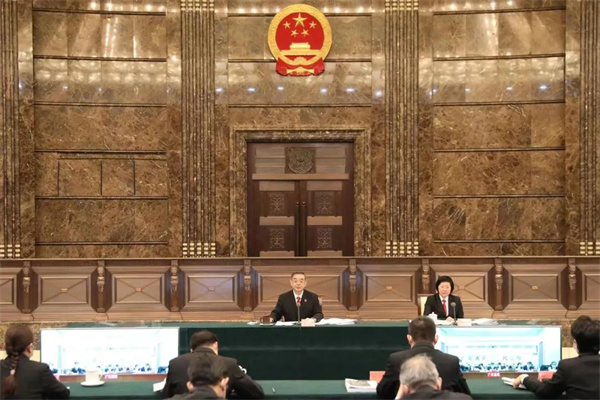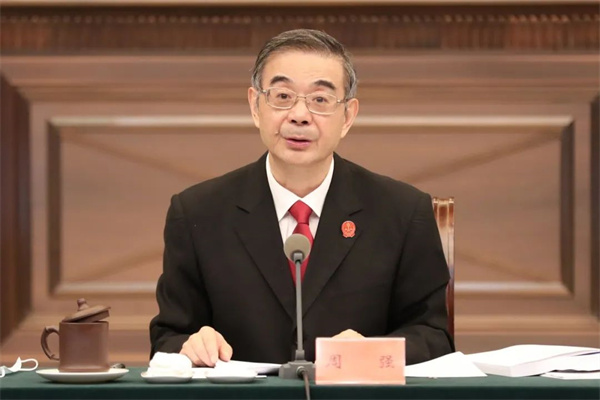SPC head urges better judicial services for ecological civilization
People's courts at all levels should thoroughly study and implement the guiding principles of the 20th National Congress of the Communist Party of China (CPC), accurately understand the significance and key tasks of promoting the harmonious coexistence between human and nature, and enhance the high-quality growth of environmental resources trials.
Zhou Qiang, president of the Supreme People's Court (SPC), made the remarks at a symposium on criminal trials related to environmental resources held via video link on Nov 23.

A national symposium on criminal trials related to environmental resources is held on Nov 23, 2022. [Photo/court.gov.cn]
The people's courts have firmly implemented the decisions and arrangements of the CPC Central Committee; carried out the concept of "lucid waters and lush mountains are invaluable assets"; built a specialized environmental resources trial system with Chinese characteristics; heard environmental resources cases in accordance with the law; continued to reform and innovate environmental justice; helped fight against pollution; safeguarded the environmental rights and interests of the people, and served the green transformation of economic and social development in an all-round way, he said.
Thanks to these efforts, the concept of environmental justice has been fully established; the system of environmental resources adjudication with Chinese characteristics has been built; the judicial protection network for ecological environment has been further improved, and the international influence of China's environmental justice has been significantly enhanced, providing strong judicial services for the ecological civilization development and the building of a Beautiful China, according to Zhou.

Zhou Qiang, president of the Supreme People's Court, addresses the meeting. [Photo/court.gov.cn]
Zhou stressed adherence to the high-quality growth and implementation of the new development concept, and the integration of environmental resource justice into the national environmental governance system.
He urged people's courts to implement the green principle in the Chinese Civil Code, accelerate the green transformation of the development mode through judicial services, promote regional coordinated governance of ecological environment, strengthen the judicial protection of biodiversity, improve judicial services for China's carbon peak and carbon neutrality goals, and help preserve blue skies, clear water, and pollution-free land.
Zhou called for more efforts to address environmental problems that people are greatly concerned about, improve the system of environmental public interest litigation and compensation litigation for ecological environmental damage, enhance ecological environment quality and urban and rural living environments, serve the construction of beautiful villages, and safeguard the environmental rights and interests of the people.
Efforts should be made to promote the rule of law in both domestic and foreign-related cases, participate in the formulation of international environmental governance rules, deepen international judicial exchanges and cooperation, and make China's environmental justice better known, Zhou noted.
He also emphasized the importance of the justice system and mechanism, criminal trials, the construction of an all-round ecological and environmental protection litigation system, and a professional judicial team in ecological and environmental protection.









